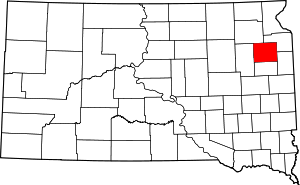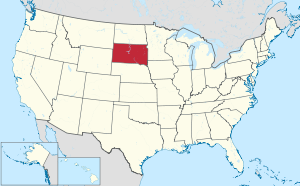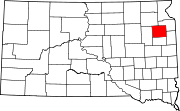Codington County, South Dakota
Codington County | |
|---|---|
 Coding County Courthouse in July 2013 | |
 Location within the U.S. state of South Dakota | |
 South Dakota's location within the U.S. | |
| Coordinates: 44°59′N 97°11′W / 44.98°N 97.18°W | |
| Country | |
| State | |
| Founded | 1878 |
| Named for | Reverend George S. S. Codington |
| Seat | Watertown |
| Largest city | Watertown |
| Area | |
• Total | 717 sq mi (1,860 km2) |
| • Land | 688 sq mi (1,780 km2) |
| • Water | 29 sq mi (80 km2) 4.0% |
| Population | |
• Estimate (2015) | 27,939 |
| • Density | 40/sq mi (20/km2) |
| Time zone | UTC−6 (Central) |
| • Summer (DST) | UTC−5 (CDT) |
| Congressional district | At-large |
| Website | www |
Codington County is a county located in the U.S. state of South Dakota. As of the 2010 census, the population was 27,227.[1] Its county seat is Watertown.[2] The county was created in 1877 and organized in 1878.[3] It is named for Rev. George S. S. Codington, legislator.[4]
Codington County comprises the Watertown, SD Micropolitan Statistical Area.
Geography

According to the U.S. Census Bureau, the county has a total area of 717 square miles (1,860 km2), of which 688 square miles (1,780 km2) is land and 29 square miles (75 km2) (4.0%) is water.[5]
Major highways
Adjacent counties
- Grant County - northeast
- Deuel County - southeast
- Hamlin County - south
- Clark County - west
- Day County - northwest
Demographics
| Census | Pop. | Note | %± |
|---|---|---|---|
| 1880 | 2,156 | — | |
| 1890 | 7,037 | 226.4% | |
| 1900 | 8,770 | 24.6% | |
| 1910 | 14,092 | 60.7% | |
| 1920 | 16,549 | 17.4% | |
| 1930 | 17,457 | 5.5% | |
| 1940 | 17,014 | −2.5% | |
| 1950 | 18,944 | 11.3% | |
| 1960 | 20,220 | 6.7% | |
| 1970 | 19,140 | −5.3% | |
| 1980 | 20,885 | 9.1% | |
| 1990 | 22,698 | 8.7% | |
| 2000 | 25,897 | 14.1% | |
| 2010 | 27,227 | 5.1% | |
| 2015 (est.) | 27,939 | [6] | 2.6% |
| U.S. Decennial Census[7] 1790-1960[8] 1900-1990[9] 1990-2000[10] 2010-2015[1] | |||
2000 census
As of the census[11] of 2000, there were 25,897 people, 10,357 households, and 6,877 families residing in the county. The population density was 38 people per square mile (15/km²). There were 11,324 housing units at an average density of 16 per square mile (6/km²). The racial makeup of the county was 96.74% White, 0.14% Black or African American, 1.41% Native American, 0.28% Asian, 0.02% Pacific Islander, 0.57% from other races, and 0.84% from two or more races. 1.06% of the population were Hispanic or Latino of any race. 48.2% were of German, 20.0% Norwegian and 5.5% Irish ancestry according to the 2000 census. 96.7% spoke English, 1.5% Spanish and 1.2% German as their first language.
There were 10,357 households out of which 33.60% had children under the age of 18 living with them, 54.50% were married couples living together, 8.10% had a female householder with no husband present, and 33.60% were non-families. 27.90% of all households were made up of individuals and 10.80% had someone living alone who was 65 years of age or older. The average household size was 2.46 and the average family size was 3.04.
In the county, the population was spread out with 26.80% under the age of 18, 10.40% from 18 to 24, 28.00% from 25 to 44, 20.70% from 45 to 64, and 14.10% who were 65 years of age or older. The median age was 35 years. For every 100 females there were 98.50 males. For every 100 females age 18 and over, there were 96.50 males.
The median income for a household in the county was $36,257, and the median income for a family was $45,153. Males had a median income of $30,279 versus $19,826 for females. The per capita income for the county was $18,761. About 5.60% of families and 9.00% of the population were below the poverty line, including 8.60% of those under age 18 and 10.80% of those age 65 or over.
2010 census
As of the 2010 United States Census, there were 27,227 people, 11,432 households, and 7,216 families residing in the county.[12] The population density was 39.5 inhabitants per square mile (15.3/km2). There were 12,397 housing units at an average density of 18.0 per square mile (6.9/km2).[13] The racial makeup of the county was 95.3% white, 2.0% American Indian, 0.4% Asian, 0.3% black or African American, 0.6% from other races, and 1.3% from two or more races. Those of Hispanic or Latino origin made up 1.6% of the population.[12] In terms of ancestry, 54.3% were German, 22.6% were Norwegian, 9.6% were Irish, 6.7% were English, and 3.3% were American.[14]
Of the 11,432 households, 30.7% had children under the age of 18 living with them, 49.9% were married couples living together, 9.0% had a female householder with no husband present, 36.9% were non-families, and 30.6% of all households were made up of individuals. The average household size was 2.35 and the average family size was 2.93. The median age was 37.7 years.[12]
The median income for a household in the county was $43,275 and the median income for a family was $60,202. Males had a median income of $39,076 versus $26,945 for females. The per capita income for the county was $24,781. About 8.9% of families and 12.7% of the population were below the poverty line, including 13.7% of those under age 18 and 16.8% of those age 65 or over.[15]
Communities
City
- Watertown (county seat)
Towns
Census-designated place
Unincorporated communities
Townships
The county is divided into seventeen townships:
- Dexter
- Eden
- Elmira
- Fuller
- Germantown
- Graceland
- Henry
- Kampeska
- Kranzburg
- Lake
- Leola
- Pelican
- Phipps
- Rauville
- Richland
- Sheridan
- Waverly
See also
References
- ^ a b "State & County QuickFacts". United States Census Bureau. Retrieved November 26, 2013.
- ^ "Find a County". National Association of Counties. Archived from the original on 2011-05-31. Retrieved 2011-06-07.
{{cite web}}: Unknown parameter|deadurl=ignored (|url-status=suggested) (help) - ^ "Dakota Territory, South Dakota, and North Dakota: Individual County Chronologies". Dakota Territory Atlas of Historical County Boundaries. The Newberry Library. 2006. Retrieved March 29, 2015.
- ^ Gannett, Henry (1905). The Origin of Certain Place Names in the United States. Govt. Print. Off. p. 86.
- ^ "2010 Census Gazetteer Files". United States Census Bureau. August 22, 2012. Retrieved March 23, 2015.
- ^ "County Totals Dataset: Population, Population Change and Estimated Components of Population Change: April 1, 2010 to July 1, 2015". Retrieved July 2, 2016.
- ^ "U.S. Decennial Census". United States Census Bureau. Archived from the original on May 11, 2015. Retrieved March 23, 2015.
{{cite web}}: Unknown parameter|deadurl=ignored (|url-status=suggested) (help) - ^ "Historical Census Browser". University of Virginia Library. Retrieved March 23, 2015.
- ^ Forstall, Richard L., ed. (March 27, 1995). "Population of Counties by Decennial Census: 1900 to 1990". United States Census Bureau. Retrieved March 23, 2015.
- ^ "Census 2000 PHC-T-4. Ranking Tables for Counties: 1990 and 2000" (PDF). United States Census Bureau. April 2, 2001. Retrieved March 23, 2015.
- ^ "American FactFinder". United States Census Bureau. Archived from the original on 2013-09-11. Retrieved 2011-05-14.
{{cite web}}: Unknown parameter|deadurl=ignored (|url-status=suggested) (help) - ^ a b c "DP-1 Profile of General Population and Housing Characteristics: 2010 Demographic Profile Data". United States Census Bureau. Retrieved 2016-03-11.
- ^ "Population, Housing Units, Area, and Density: 2010 - County". United States Census Bureau. Retrieved 2016-03-11.
- ^ "DP02 SELECTED SOCIAL CHARACTERISTICS IN THE UNITED STATES – 2006-2010 American Community Survey 5-Year Estimates". United States Census Bureau. Retrieved 2016-03-11.
- ^ "DP03 SELECTED ECONOMIC CHARACTERISTICS – 2006-2010 American Community Survey 5-Year Estimates". United States Census Bureau. Retrieved 2016-03-11.

